Coronavirus may have huge impact on property markets
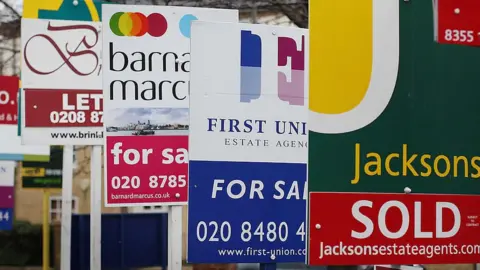 Getty Images
Getty ImagesThe saying "there is no place like home" is perhaps not so heart-warming a thought these days.
After all, most of us have been locked down in our house or apartment for a very long time.
The coronavirus pandemic will, however, do more than change the way we might feel about our homes. It has the potential to have a huge impact on property markets around the world.
It is fairly clear that with massive unemployment, wage cuts, business failures, and job uncertainty, many people are likely to be cautious about making the biggest investment of their lives - buying a home.
Normally that leads to falling house prices, and during the last recession and credit crunch that is what we saw in the UK, US and many other countries.
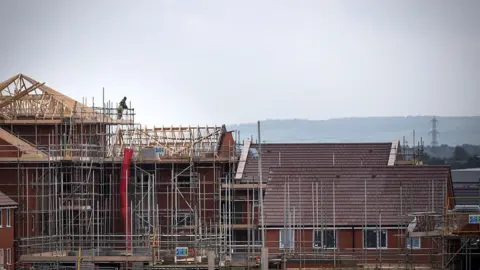 Getty Images
Getty ImagesIn the UK, the Nationwide house price index for May showed that prices fell 1.7% from the previous month, the largest decline for 11 years.
But as Robert Gardner, the Nationwide's chief economist, points out, "there are some signs this is starting to stabilise". He adds that this is because the current situation is not a typical economic downturn.
Instead, the UK government - like others around the world - consciously decided to put much of the economy on hold. This was at the same time as putting in place a host of measures to support households and businesses, such as the worker furloughing scheme.
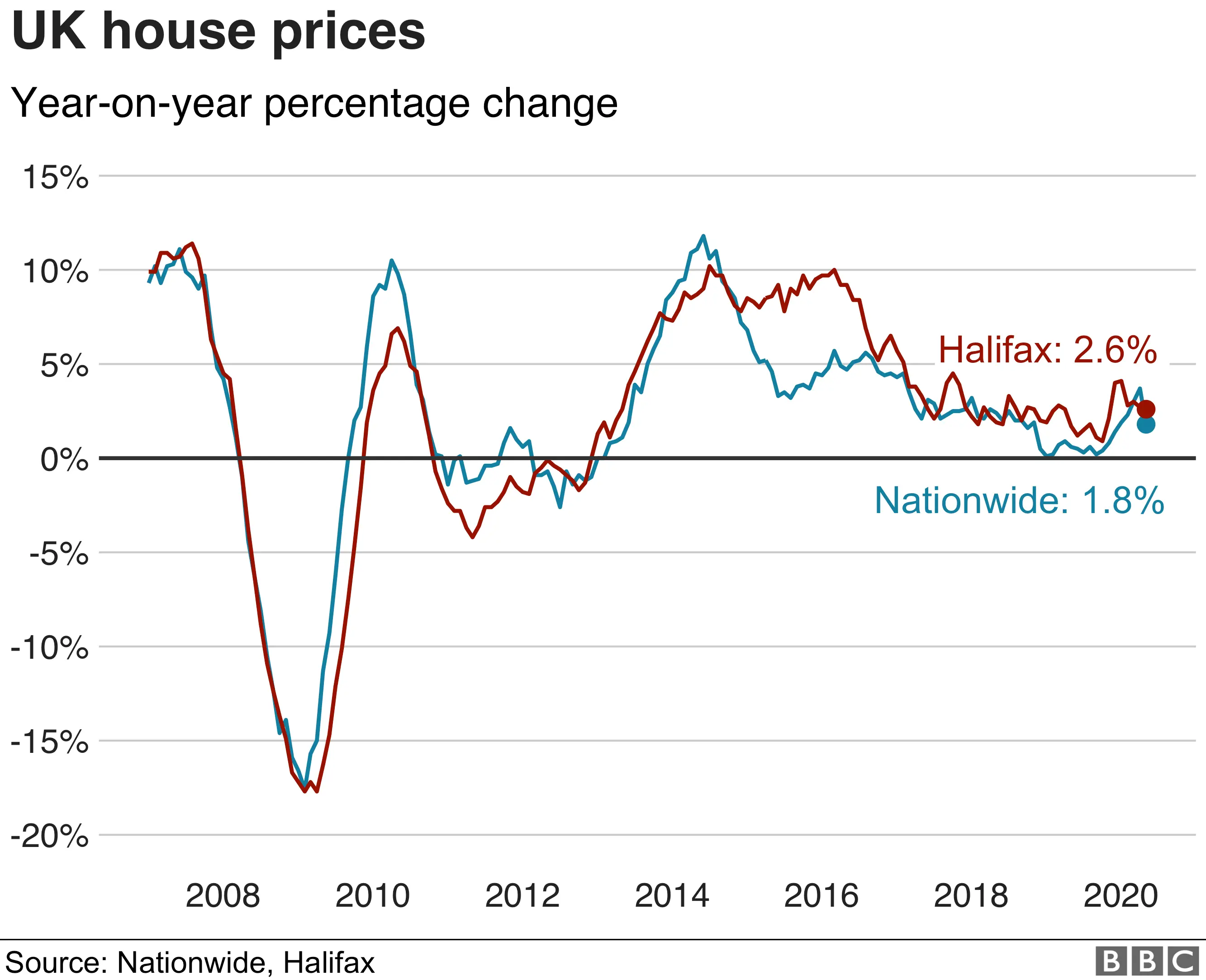
The hope, therefore, is that as lockdown restrictions continue to be lifted, economies and housing markets will rebound.
In the US, house prices are still rising. "Many areas [of the country] have put a moratorium on evictions, normally for 60 to 90 days, but in some areas for six months," says Prof Nori Gerardo Lietz, who teaches real estate investment at Harvard Business School.
This means that the immediate problems have been pushed on to landlords and the banks, which isn't to say that there won't be trouble further down the line. Especially as the US unemployment rate remains sky high since the coronavirus lockdown - 13.3% in May, albeit down from 14.7% in April.
However, behind those headline figures, there are other forces at work on the property sector. Many of us have suddenly realised that we can work from home and avoid the commute and the office, and this is already having an influence on the market.
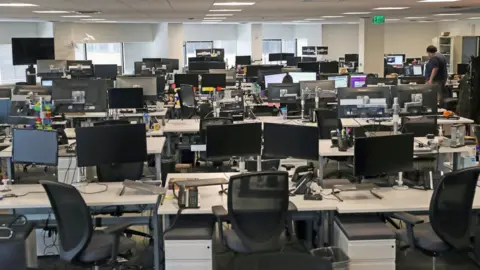 Getty Images
Getty ImagesRightmove, the UK property website, has reported a significant rise in the number of people searching for homes further from town and city centres, with larger gardens and space for a home office. This may not be a permanent change, but coronavirus is certainly making many people think about how and where they work and live.
For the commercial property sector, the changes are far more dramatic, especially on the UK's High Streets.
"Retail [in the UK] has had problems for ages," says Prof Michael White, an expert in real estate economics, at Nottingham Trent University. "And at the moment incomes are obviously being hit by furloughs, and then there will be a squeeze on spending in a recession."
It means an acceleration of what we saw before the virus struck - many High Streets have been decaying for years. And now that many more of us have discovered how much we can buy online that is only going to increase in speed.
An added issue is that before coronavirus, the trend was already towards fewer shops on the High Street, and more services - things you can't get online - such as cafes, hairdressers and beauticians.
"The twist is that these services have been hit, so we have seen a slowing down of a growing trend," says Prof Andrew Baum, who leads the Future of Real Estate Initiative at Oxford University's Said Business School.
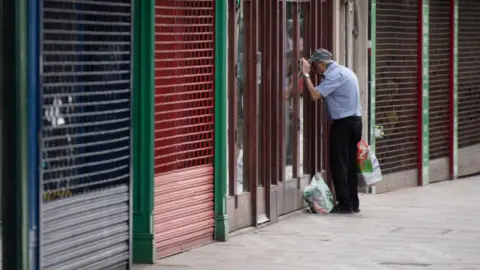 Getty Images
Getty ImagesThis means that High Streets have been hit twice as hard - many stores are shut and face-to-face service suppliers have almost totally closed.
The result has been a rise in rent arrears. If this is just a matter of landlords missing or deferring one or two quarters of rents, that is not a massive problem for the industry.
But if this is the start of a long-term trend then that will cause problems, and possibly a knock-on fall in the capital value of many retail properties, possibly by 20%-30% believes Prof Baum.
In the US, where there has been a similar trend in the retail sector, the problem is slightly different. As land is so cheap, and planning permission so easy to get, there is a long tradition of retail parks and malls just being abandoned if they are not making money, or cost too much to upgrade. The impact of coronavirus could see this trend increase.
"The problem with US retail is not that it's over built, but that it is under demolished," says Prof Gerardo Lietz.
 Jamey Stilling
Jamey StillingFor providers of office space, if coronavirus turns out to be a one-off hit, with just two quarters of rents deferred, there is little reason for property values to be affected at all.
But instead, coronavirus might actually have a massive influence on the sector. After all, if the housing market changes as people look for more suburban and rural properties where they can work from home, there will be less need for office space to work in.
The office property market will therefore have to adapt, something Prof White believes the industry is very good at.
As he explains, if you strip out inflation, "average rents in London are the same as they were 100 years ago". He says this shows that the office property market has been very good at matching supply and demand for a very long period of time.
As the UK's capital needed more offices in the 1950s and 1960s, many of the townhouses of the West End were converted from residential to commercial use. Then the City of London was rebuilt in the 1980s, with skyscrapers appearing, and Canary Wharf was constructed in London's former docklands in the 1990s.
Recently, as London has needed more accommodation, buildings including office blocks have been turned back into flats and apartments.
 Getty Images
Getty ImagesOverall, the property market has two things going for it even in these rapidly changing times.
The first is that even if the price of property falls, it may still be a wise investment. This may sound perverse, but property is a long-term investment, and not many others are both secure and pay a good return.
So if government bonds are paying 0.5% interest a year, or even less, and property is making 3-5%, you still have a good source of income if you are a private investor or global investment fund.

Global Trade

The second factor is that for all the talk of bricks and mortar being solid and unchanging, the sector has over the years proved to be remarkably flexible.
Over time the use of land and buildings can change, and often it does so remarkably quickly. Look at the environment you live in, and there will be plenty of evidence of that - shops that are now flats, old factories that are now hotels, and warehouses that have become dance studios.
The coronavirus pandemic may be a massive shock to property markets, but it may well just speed up changes that are already taking place.
